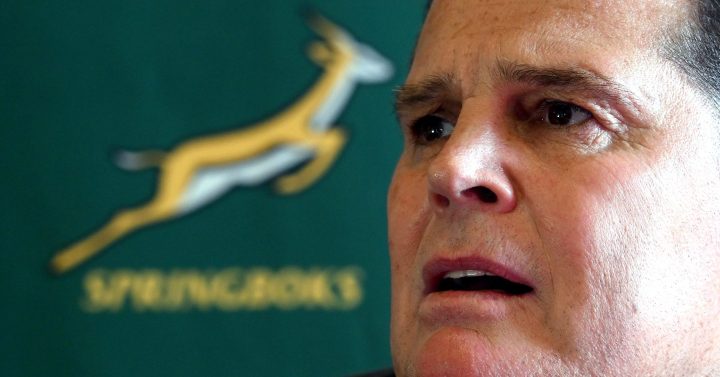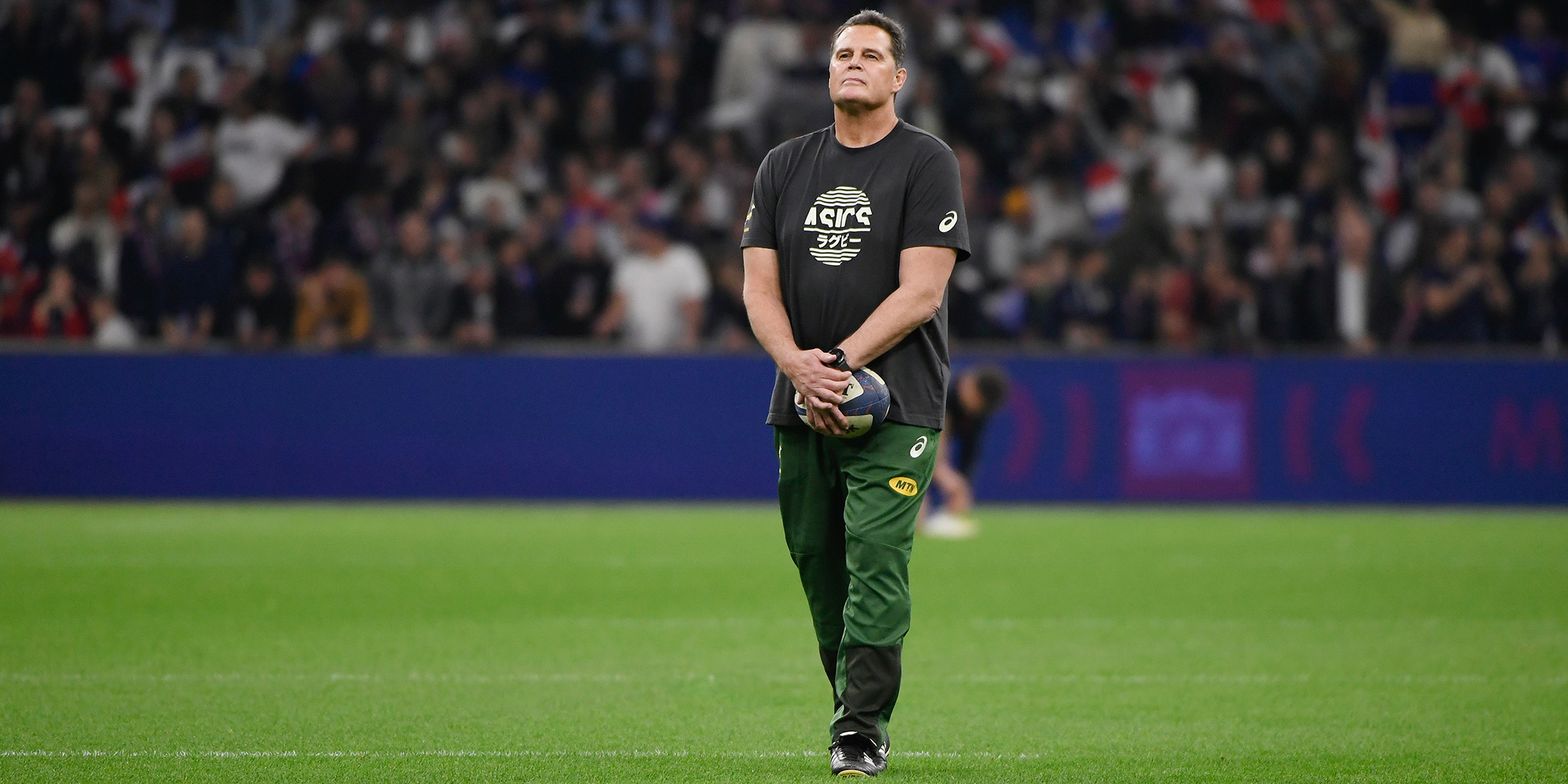ANALYSIS
Rassie Erasmus’ explanation for use of social media does not exonerate him from content responsibility

In the fashion of a man who wants to shape the world to his view, South Africa’s director of rugby, Rassie Erasmus, took to social media this week to explain some of his previous posts.
In recent weeks, Rassie Erasmus has tweeted about refereeing inconsistencies that resulted in negative outcomes for the Springboks. Those tweets landed him in the headmaster’s office at World Rugby and he was subsequently banned from touchline and media engagements for two matches.
That followed his 10-month ban handed down on 18 November 2021, when Erasmus was suspended from all matchday activities. He was also banned from all rugby activities for two months after six misconduct charges were brought against him, stemming from a 62-minute video that “leaked” into the public domain in July 2021 after the first Test between the Springboks and British & Irish Lions.
No sooner had the 10-month ban ended, and he was back on social media harpooning officials. And within hours of the latest two-match suspension coming to an end, Erasmus hosted a “lekka chat” on media platform Vimeo to explain why he goes on social media to criticise refs.
It’s all a bit odd.
No coach has done more for the good of South African rugby than Erasmus. Besides presiding over a World Cup-winning team, he has overseen the most racially transformed Boks squad; appointed the first black captain in Siya Kolisi and presented the most human side of the sport to the public. He is immensely likeable and approachable.
But he is also mysterious and complex, and despite the “aww shucks” blue-collar persona, in a rugby context he is a ruthless operator with a maniacal winning mentality.
Outside of rugby, he is a flawed human, as he has freely admitted before. But, as Bono sang, “throw a rock in the air and you’ll hit someone guilty.” We are all flawed.
So, despite the latest video, we are really no closer to really finding out why Erasmus is so committed to using social media to drive his point home, other than the obvious desire to give his team an edge. And it’s debatable whether the strategy is helping.
What’s not in question is that when the Boks play well, like they did against England, they are almost unstoppable. They take the refs out of the equation with performances like that. Perhaps more focus is needed on what produced that level of excellence and less on public dissections of officials.
“Why would I do this?” Erasmus asked in his 20-minute Vimeo explanation, which was shared on his Twitter account.
“Sometimes when you do press conferences and stuff like that, you don’t always get the opportunity to get the whole what you said (sic). Sometimes the press conference gets cut into pieces…” he said.
“We are competing with what is the opinion of people, which is sometimes 100% right, but sometimes when you are trying to give a player confidence, a goalkicker or a guy who is making his debut or a person who feels he must be in the team or a player who has been dropped and then what happens on social media if you are not on top of that.
“So I decided to join just to find out why are players leaving on a Wednesday afternoon and you see them on a Thursday evening and they are either walking on water and some guys are level headed where it doesn’t influence them but then with others you see there is a hell of a story going on out there. So that is why I joined social media.”

Rassie Erasmus has been posting clips from Springbok games that show errors by officials. It’s a dangerous ploy after already serving a 10-month touchline ban for bringing the game into disrepute. (Photo: Gallo Images)
Visit Daily Maverick’s home page for more news, analysis and investigations
Social responsibility
Erasmus explained that the three layers they initially saw were the team, the media and the fans. The idea was that the Boks would be as accessible to the media as possible, and then hopefully the media would carry an accurate message to the fans.
His decision to move into the world of social media, though, was to cut out the media – or at least dilute its impact by doing his own posting to shape the narrative.
In theory, it’s not a bad ploy. Corporations and individual brands use social media to project a palatable image of their company or personality to the world, on their own terms.
So why shouldn’t Erasmus be allowed the same platform? Of course, he should. But it comes with responsibility, and it comes with the possibility and probability of being challenged and questioned, even more so than in a press conference.
Also, used wisely, Erasmus could educate us about tactics and plans devised for certain scenarios. It could be a positive educational journey for us all.
But if the focus is only on the injustices – both perceived and real – committed against the Boks, it loses impact.
Perhaps Erasmus – by deciding to control the narrative and cut out the media who he might feel is agenda driven – underestimated the positive and negative power he holds.
Reasons secondary to content
According to Erasmus, when asked why he was posting videos of officials’ errors, he said he wasn’t posting to criticise refs, but to educate fans by bypassing the media to deliver his message.
Fair enough, but his reasons are not as important as the content he delivers.
World Rugby hasn’t handed down these heavy suspensions because of Erasmus’ media strategy or reasoning. Lots of coaches and players are on various social media platforms. World Rugby has handed down these suspensions because Erasmus undermines officials in the public domain. It’s one of rugby’s biggest taboos.
Of course, people are divided on the issue because so many believe it’s time rugby punished officials for poor decisions. And it is irrefutably true that referees make mistakes.
What’s not irrefutably true, though, is that they are biased or cheats. That would require proof, such as messages instructing officials to cheat, or through forensic details of illicit payments made to officials. As far as I’m aware, there is no such investigation currently.
Yet, through his posts highlighting mistakes against the Boks, Erasmus’ inference of impropriety leads the discourse onto much shakier ground.
Those that want to believe the Boks are victims of some or other nefarious plot will find enough subtle nudges to feed their paranoia in Erasmus’ posts. It’s social media 101 – raise the levels of anger.
The counter position could be that Erasmus is bullying officials – perhaps even coercing them through his posts. Match officials are presiding over a game with literally hundreds of actions over the course of 80 minutes, when a multitude of decisions need to be made in an instant.
Even Erasmus has called it an impossible task in his column for the UK’s Mail on Sunday, published on 30 April .
“It’s impossible to expect a referee to make between 800 and 850 decisions in one match. The game isn’t allowed to flow anymore and you’re always going to end up with one team that is pissed off,” he wrote.
And yet, through his recent posts, the implication is that he demands perfection from referees at all times. If not, they will be exposed in a series of tweets.
He only highlights mistakes against the Boks, creating the narrative that there is bias against the world champions, while underlining the imperfections of referees’ performances in a situation he well knows is set up to make officials fail.
Erasmus is adding pressure on the officials and possibly influencing them to be biased towards the Boks. Again, thanks to rugby’s morass of grey areas when it comes to the application of the laws, the bias or otherwise can’t be definitively proven.
Dressing up the criticism as “communicating with fans” is creating plausible deniability.
So, by all means Rassie, keep using social media. That is your right.
But what you post and the message you deliver has consequences. Like referees, you don’t always get it right. DM



















 Become an Insider
Become an Insider
Comments - Please login in order to comment.